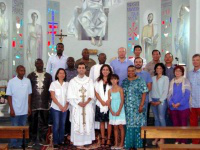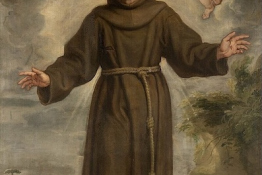Oblate Father appointed Apostolic Prefect of Western Sahara

On Sunday, 29 September 2013, Monsignor Mario Leon Dorado took canonical possession of the Apostolic See of Sahara during a solemn celebration presided by him in the cathedral of Laayoune, surrounded by representatives of the United Nations and some of the faithful who had come for the event. On 24 June 2013, Pope Francis had named him Apostolic Prefect of Western Sahara.
In his homily, he briefly explained the role and mission of the Apostolic Prefect: “To govern, teach, sanctify and to guard the patrimony of the Church.” Since he had already pronounced the profession of faith and oath of fidelity before the Apostolic Nuncio on September 11, 2013, in his private chapel in Rabat, it was a question, here in Laayoune, of completing the rite with the reading of the decree of appointment (the Latin text was read by Father Valerio Eko, superior of the mission) and the signing of the formal certification by some witnesses present at the ceremony: Mr Ambassador Nicolas Amouzou (Africa), Mr Jose Maria S Medalla (Asia), Mr Carlos Bengoechea (Europe) and Katia Gonzalez Carbonell (America), to point out that the five continents were well represented at the event.
Mgr Mario has become the third Apostolic Prefect of Sahara, after Mons. Félix Erviti (1954-1995) and Mgr Acacio VALBUENA (1995-2009).
Born on 17 March 1974 in Madrid, Mons. Mario grew up in the Oblate parish in Aluche where he also found his missionary and religious vocation. He made his first vows on 15 September 1996.
Ordained on 2 June, 2001, his desire to exercise his pastoral ministry in the Arab-Muslim world was fulfilled when, after three years of service in the parish of Jaen (Spain), he received his obedience to go to the Sahara Mission in 2004. He immediately began learning Arabic, English and French for a thorough integration into the reality of his new mission. Fascinated by Islam and Arab culture, Mario is a self-starter who continually and personally updates himself.
The Apostolic Prefecture of the Sahara is in Africa, covers the whole of the Western Sahara, a vast area of 266,000 km², bordered by the Atlantic Ocean to the west, and by Mauritania to the south and east. Currently the Apostolic Prefecture of the Sahara consists of only two churches, one in Laayoune and another in Dakhla, the former Villa Cisneros, and a chapel in Laayoune Port (Laayoune Marsa).
The Apostolic Prefecture has only two religious priests for a vast territory larger than Great Britain. There is an Apostolic Prefect and a superior of the mission, a special situation for this mission, unique in its statutes and its character.
There are no indigenous Christians in the country which is 100% Muslim. Fr Eko writes: "The few faithful who attend our churches are all foreigners and people passing through. The UN staff operating in this part of the country (MINURSO) seems to be the most stable."
The occupation of the Western Sahara by Morocco is one of the unresolved territorial disputes of the United Nations. A Spanish posession from 1885, after Spain left in 1975, the territory was invaded by Mauritania and Morocco. The Mauritanians left but Morocco is still in occupation. More than 200,000 Saharawi people were driven into the desert by Moroccan and live in very difficult conditions in refugee camps in Algeria, while the remaining Sahawaris are treated as second class citizens in their own country which is under military occupation. They are demanding their own autonomous state.
See also: ICN 9 October 2013 - Javier Barden introduces Sons of the Clouds - The Last Colony www.indcatholicnews.com/news.php?viewStory=23378















